Democrats Stand Behind Democracy and Local Leaders at Annual Event
- Details
- Written by Joanne Wallenstein
- Hits: 1498
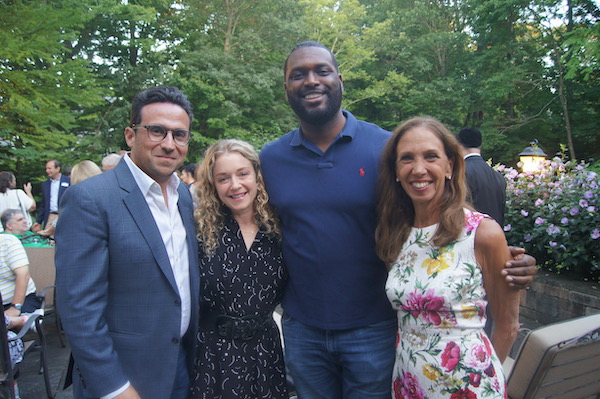
The timing was perfect to acknowledge local leaders, support the party and recognize the importance of defending democracy. All of the speakers remarked on the critical role of both leaders and citizens in preserving free speech and the rule of law.
The event was hosted by the Scarsdale Democrats and Paulin who offered up her home and fresh made pizzas from an outdoor pizza oven.
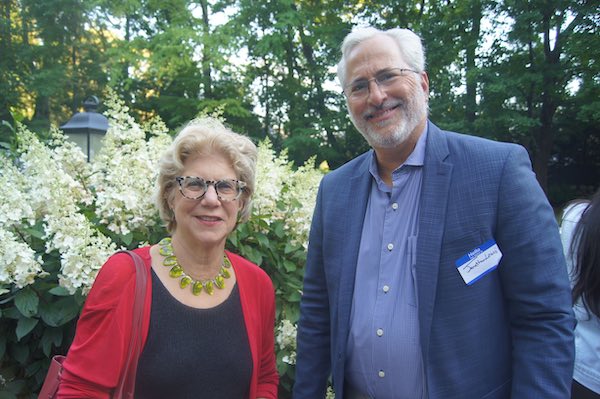 State Senator Shelly Mayer and former Village Trustee Jonathan Lewis
State Senator Shelly Mayer and former Village Trustee Jonathan Lewis
Myra Saul, who heads up the Scarsdale Democrats introduced the attendees that included state, county and local officials along with candidates for justice. She thanked the event committee, BK Munguia, Susan Kessler Ross, Laura Daniels, Tim Foley, Carlos Ramirez, Michelle Lichtenberg, Nan Berke, Sarah Kagan, Jeannie Rosenthal and Elaine Weir Sherman for organizing the evening.
About Trump, State Senator Shelly Mayer said, “The fact that he was indicted is a tribute to our democracy …. We can fight, we can disagree and we’re luck to live in a country where we can do this. The stakes are so high that we must unite to defend our democracy.”
The keynote speaker was former Congressman Mondaire Jones who lost his seat due to re-districting and is running for Congressional District 17, a seat held by Republican Mike Lawler. Also on hand was County Executive George Latimer who is said to be considering a run to unseat Jamaal Bowman for Congressional District 16 which includes Scarsdale.
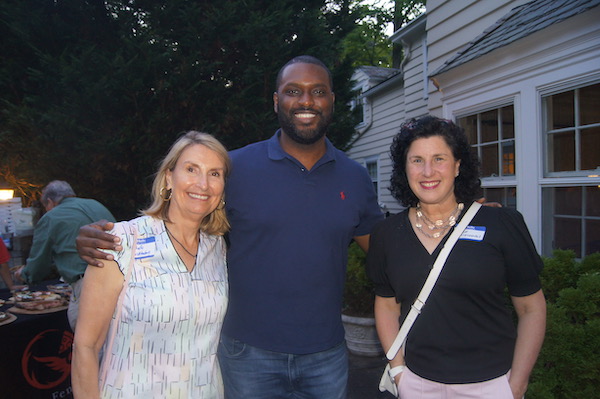
Jones said, “We are facing a crisis unlike anything we have experienced as a nation,” and called upon “the committed group of public servants” to make good choices. In Congress he was voted the most legislatively active Congressman and noted that while in office Congress “rescued the economy from collapse, “passed the biggest infrastructure bill in history,” and brought money for schools and housing at a time people were struggling. He vowed to defend a woman’s right to choose, and to defend educational freedom to teach the truth about slavery and the holocaust.
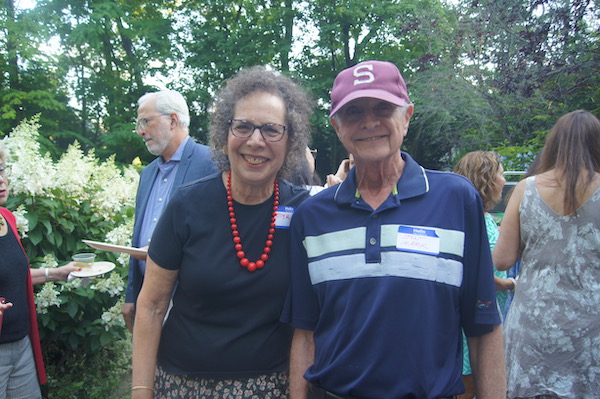
Among the group was Scarsdale Mayor Justin Arest and former mayors Marc Samwick, Jon Mark and Carolyn Stevens. Current and former Village trustees Dara Gruenberg, Jonathan Lewis and Seth Ross, County Legislator Ben Boykin and candidate for County Legislator Ruth Walter along with several judges and aspirants for State Supreme Court.
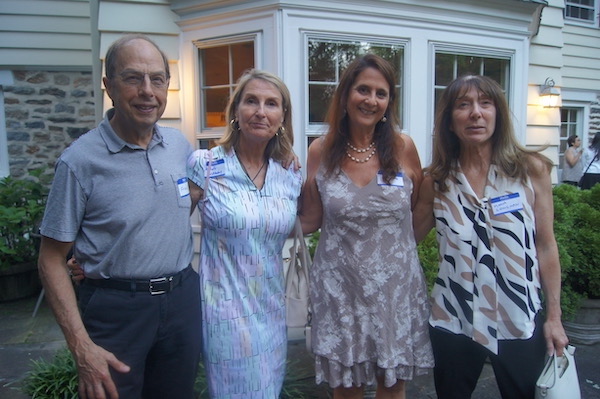
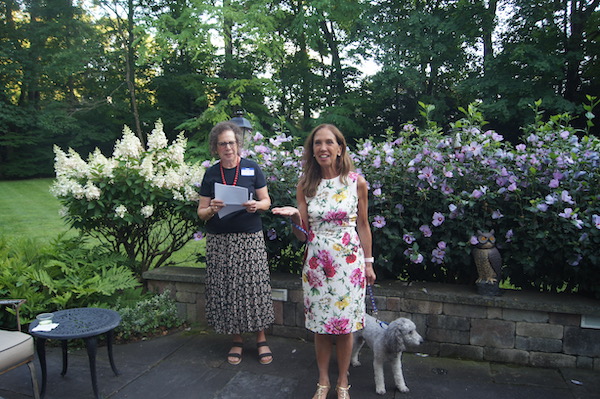
21 Things To Do This Summer
- Details
- Written by Vivian Zweig
- Hits: 2128
 To quote a popular children’s TV show:
To quote a popular children’s TV show:
“There's a hundred and four days of summer vacation,
'Til school comes along just to end it,
So the annual problem for our generation,
Is finding a good way to spend it…” (Phineas and Ferb).
Regardless of your age, finding a way to spend your free time—particularly in the summertime—can be daunting. From hiking to painting to roller skating, here are 21 activities—in all five boroughs and beyond—to do this summer with friends, family, and partners:
Nature
- Visit the Untermyer Gardens Conservancy.
- 945 N Broadway, Yonkers, NY 10701
- (914) 613-4502
- Stroll through Manor Park.
- 108 Park Ave, Larchmont, NY 10538
- (914) 834-4309
- Hike at the Weinberg Nature Center.
- 455 Mamaroneck Rd, Scarsdale, NY 10583
- (914) 722-1289
- Explore the trails at the Rockefeller State Park Preserve.
- 126 Phelps Way, Pleasantville, NY 10570
- (914) 631-1470
- See the blooms at the New York Botanical Garden.
- 2900 Southern Blvd., Bronx, NY 10458
- (718) 817-8700

- Look at the animals at the Bronx Zoo.
- 2300 Southern Blvd, Bronx, NY 10460
- (718) 220-5100
- Interact with the butterflies at American Museum of Natural History’s Butterfly Conservatory.
- 200 Central Park West, New York, NY 10024
- (212) 769-5100

Art
- Paint pottery at Plaster Palace Pottery.
- 2005 Palmer Ave, Larchmont, NY 10538
- (914) 670-8181
- Paint and dine at Muse Paint Bar.
- 84 Mamaroneck Ave, White Plains, NY 10601
- (888) 607-6873
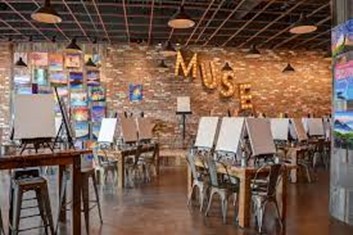
- Learn how to paint at The Art Studio NY.
- 145 W 96th St, New York, NY 10025
- (212) 932-8484
- Enjoy art and music with a Date Night at the MET.
- 1000 5th Ave, New York, NY 10028
- (212) 535-7710
- Experience art, science, and technology at the Artechouse.
- 439 W 15th St, New York, NY 10011

Entertainment
- Listen to live jazz music at:
- Smoke Jazz & Supper Club.
- 2751 Broadway, New York, NY 10025
- (212) 864-6662
- Smoke Jazz & Supper Club.
- Birdland Jazz Club.
- 315 W 44th St #5402, New York, NY 10036
- (212) 581-3080
- Blue Note.
- 131 W 3rd St, New York, NY 10012
- (212) 475-8592
- Watch a movie at Bryant Park.
- New York, NY 10018
- (212) 768-4242

- See what’s playing at Skyline Drive In NYC.
- 1 Oak St, Brooklyn, NY 11222
- (347) 462-0353
Activities
- Skate with Flipper’s Roller Boogie Palace at Rockefeller Center.
- 600 5th Ave, New York, NY 10020
- (212) 771-7200

- Learn how to cook during Sur la Table’s Date Night.
- 306 W 57th St, New York, NY 10019
- (212) 574-8334
- Do yoga with puppies at Woof Wellness Puppy Yoga.
- 431 5th Ave, 6th Floor New York, NY 10016

- Climb at The Cliffs at Valhalla.
- 1 Commerce St, Valhalla, NY 10595
- (914) 328-7625
- Play board games and dine at The Uncommons.
- 230 Thompson St, New York, NY 10012
- (646) 543-9215

- Go thrifting at:
- L Train Vintage.
- 204 1st, New York, NY 10009
- Buffalo Exchange.
- 114 W 26th St, New York, NY 10001
- (212) 675-3535
- AuH2O.
- 84 E 7th St, New York, NY 10003
- (917) 261-7474
- East Village Thrift Shop.
- 186 2nd Ave, New York, NY 10003
- (646) 590-2021
- L Train Vintage.
From Hermione Granger to Tony Stark: Making "Smart" the New "Cool"
- Details
- Written by Sameer Ahuja
- Hits: 1325
 (The following was written by Scarsdale Village Trustee Sameer Ahuja)
(The following was written by Scarsdale Village Trustee Sameer Ahuja)
To Remain the World’s Indispensable Nation, We Must Bring Back Intellectual Life in America
Richard Hofstadter (1916-1970) was one smart cookie. Two-time winner of the Pulitzer Prize, he served as a Columbia University professor. He also wrote the famous social science text “Anti-intellectualism in American Life.”
Here’s how he defined anti-intellectualism: “A resentment and suspicion of the life of the mind and of those who are considered to represent it; and a disposition constantly to minimize the value of that life.”
Sound familiar? Does it not feel like intellectual life is being minimized in 2023 and for some years now?
We may frame diplomas on the wall to impress others but are we actually celebrating our intellectuals? Not so much. Once upon a time, popular TV programs, like The Mike Douglas Show would regularly have brainy authors on as guests, such as Norman Mailer and Truman Capote.
Sound Bites and Snapshots: How Intellectualism Lost Ground to Modern Media
In our contemporary culture, it seems we have traded deep intellectual thought and rigorous exploration for an abundant serving of superficial, vacuous content. You need look no further than the modern television landscape to find glaring examples of this shift. Consider the immense popularity of shows like MTV’s Teen Mom 2 and the seemingly undying Keeping Up with the Kardashians, which just snagged a renewal deal on Hulu. The fervor with which audiences consume these reality shows highlights a troubling trend—anti-intellectualism, it seems, is not just surviving but thriving in our modern era.
This move away from intellectualism isn't just restricted to our television choices. Reflect on the burgeoning social media scene, which is fast becoming the primary source of information for our youngest generations. Short-form platforms like TikTok, famous for their fleeting, 60-second videos, have ensnared the attention spans of millions worldwide. The majority of these videos are bite-sized dance challenges, prank wars, and viral trends are relentlessly pumped into the feeds of our young minds, creating a ceaseless cycle of ephemeral entertainment.
The Downside of Bite-Sized Information: Shortening Attention Spans
The consequence of this trend is far from harmless entertainment. A growing number of young people, raised on this steady diet of TikTok clips, confess to struggling with maintaining their attention on more extensive pieces of content. An average-length movie, once a staple of family entertainment, is now deemed too lengthy, too demanding of their shortened attention spans. If that’s the case, a good book doesn’t stand a chance. The long-term implications of this trend towards diminishing focus are indeed a cause for concern, with potential effects on academic achievement, professional productivity, and even interpersonal relationships.
Moreover, it's not just the younger generation succumbing to this shift. Adults, too, are being swayed by this trend of quick, easily digestible content. Consider the transformation of news outlets, once revered bastions of in-depth reporting and rigorous investigative journalism. Today, many traditional news providers have had to adapt to rapidly shifting consumption patterns, offering 'news shorts' and 'quick updates' to cater to the evolving viewer preferences.
Gone are the days of extensive Sunday morning reads, replaced instead with concise newsletters and minute-long news segments. For instance, the average length of sound bites from Presidential candidates, which was 43 seconds in 1968, fell to a mere 9 seconds by 1988, revealing a stark shift in public tolerance for prolonged discourse.
Similarly, in the realm of print media, we've witnessed the rise of listicles and brief opinion pieces, substituting nuanced, thought-provoking essays. It's a far cry from the intellectually stimulating content of yesteryear, as readers prefer to skim through bite-sized news or passively consume infographics, potentially missing out on the rich context and comprehensive understanding offered by more in-depth content.
Experts and Evidence: Wrestling with Anti-Intellectualism in Public Policy
This undermining of intellect has also extended, over the past seven years, to the role of experts in public policy, particularly in public health and climate science. During the COVID-19 pandemic, medical experts initially struggled with how to present warnings, recommendations, and scientific facts to political leaders and the general public. Even as the severity of the situation became clear, misinformation and conflicting advice muddied the waters. However, as the emergency worsened, experts seemed to eventually gain general appreciation, playing an increasingly central role in counteracting the spread of the disease. In the field of climate science, a stark example occurred when David Legates, a controversial researcher who rejects prevailing climate science, was hired in 2020 for a senior position in the U.S. National Oceanic and Atmospheric Administration (NOAA). These instances underscore the ongoing balancing act facing politicians, experts, and the public at large in our mutual quest to ensure the best public policy.
The Urgency of Reviving Intellectualism: A Global Perspective
Is this a problem?
You bet it is. For starters, our republic requires informed Americans to function. As Thomas Jefferson once said, "An educated citizenry is a vital requisite for our survival as a free people."
Meanwhile, China, our most significant global competitor, emphasizes engineering professions as career paths for its youngsters while American children dream of becoming YouTube Influencers. If we hope to remain the world’s indispensable nation, we must turn this around.
Reshaping Perceptions: Making Intellectualism Appealing
It’s therefore essential to reimagine the concept of being smart—to make it cool. Rather than considering academic pursuits as tedious prerequisites to lucrative careers, we should hold them up as thrilling adventures to engage our imaginations. In this spirit, let’s make ourselves “lifelong learners”, pledging to increase our capacity for knowledge—no matter our age or occupation.
At the same time, thanks to their outsized influence, content creators themselves can play a part in shifting mindsets on educational initiatives. (After all, if this is the career our young ones aspire to, let’s redirect their energies in a positive way.)
And in fairness, there are good examples out there.
Hermione Granger and Tony Stark: Fictional Advocates for Intellectualism
In the breathtaking expanse of the Marvel Cinematic Universe, Tony Stark—alias Iron Man, a self-proclaimed genius, billionaire, playboy, philanthropist—stands tall. His commanding charisma, combined with his exceptional intellect, gives him an edge, making him one of the most influential figures not just within the Avengers but in the entire Marvel multiverse. He's smart, and he knows it. More importantly, he’s cool, and the world knows it.

What we see in Stark is the glorification of intelligence. This is the counter-narrative to the stereotype that smart equates to nerdy and nerdy is uncool.
What about the world of Harry Potter? Hermione Granger didn’t transform from geek to chic by simply taming her frizzy hair. She was a heroine precisely because she was smart—her brain, her most powerful weapon, helped her defeat evil countless number of times. Hermione’s character transcends the cliché of the uncool bookworm, effortlessly combining intellectual prowess with a charming persona. It's a magic trick of sorts, one that defies the age-old stereotype that 'smart' is somehow 'uncool.'
It wasn’t her dazzling wand-waving skills that brought her admiration (although that was a component); it was her inexhaustible intellect, her tireless pursuit of knowledge, her unyielding dedication to learning that made her an iconic figure. Yet she never hid her intelligence, rather she wore it like a badge of honor. Her unabashed love for books, the endearing hand-raising in every class, and her rational, quick-witted solutions to the series' most perilous situations made her the backbone and frequent savior of the trio that included Harry and Ron.
Interestingly, there was a distinctive evolution of Hermione's portrayal throughout the series. In the initial books, she was primarily the ‘know-it-all’ - an image often associated with annoyance and social alienation. However, as the narrative progressed, her intellectual capabilities became increasingly central and critical to the storyline. Rowling cleverly allowed Hermione to grow into her intellect, marking a pivotal shift in her character portrayal.
Take the third book, Harry Potter and the Prisoner of Azkaban, for instance. Here, Hermione's intelligence quite literally manipulates time. Using the Time-Turner, she attended multiple classes simultaneously—a metaphorical and literal representation of her insatiable quest for knowledge. More crucially, it is this same Time-Turner that plays a crucial role in the book’s climax, displaying the power of intellect in problem-solving and, indeed, in saving lives.
Made with MidjourneyAI
Moreover, Hermione's intellectual charm did not diminish her emotional depth. Her compassion, loyalty, and bravery showcased an amalgamation of heart and mind, making her character not just likable, but admirable. It was the narrative force of Hermione Granger that shed the proverbial 'geeky' image and made intellectual prowess aspirational.
The Green Brothers and Minecraft: Innovative Approaches to Learning
YouTube stars like the Green Brothers, famous for channels like Crash Course and Sci-Show, have paved the way in this niche. These brothers pride themselves on answering head scratchers, like, “Why can’t we just throw all our trash in a volcano?” Yet, by explaining complex topics with clarity and charisma, they’ve made a name for themselves—all while promoting introspection as cool. Stimulating.
Meanwhile, tech has revolutionized how we consume content, offering immense potential to make intellectual pursuits more appealing. We can leverage innovative tools like streaming, chat rooms, and immersive gaming to deliver educational fare. Also, streaming platforms and online communities can serve as valuable resources to promote more cerebral content.
It’s not that kids don’t want to learn, we just have to tap into their preferences and attention styles. During the pandemic, Minecraft, famous for its engaging open-world computer game, developed an educational version for teachers. In this virtual space which kids were already accustomed to, teachers could remotely connect with students. As a bonus, Minecraft teaching academy offers teachers a free course on how to use Minecraft to build lessons, attending to students' interests.
Government and Autodidactic Learning: Stimulating Intellectual Pursuits
Meanwhile, drawing inspiration from initiatives like FDR's GI Bill, governments can also play a role in fostering intellectualism, especially amongst youth. By investing in novel educational infrastructure and scholarships programs, we can ensure that access to quality content is not a function of access to resources. Creating programs to encourage interdisciplinary learning and critical thinking will also equip students with the tools to affect societal challenges.
Next, by emphasizing autodidactic tendencies, we inspire people to take learning into their own hands with no need for formalized structure. To this end, a breathtaking amount of content (already) exists online on a range of subjects. All it takes is a curious mind to benefit from such largesse. As example, check out: Academy of Ideas and School of Life.
As with Minecraft, further collaborations between educational institutions and content services can also occur, paying intellectual dividends. Such partnerships can enhance accessibility and engagement to lifelong learning, making the pursuit of knowledge exciting. Even trendy.
We the People Can Do This
To further make intellectualism cool, We the People, can choose to empower ourselves, no matter our intellectual level. Autonomy is key. Traditional education often follows a formal curriculum, leaving little room for personal interests and passions. And boring a lot of us in the process! Instead, we can take a page from our European peers, like Germany, whose culture of “Selbständigkeit” calls for giving children autonomy, creating more resilient, self-assured young adults.
On top of the need for autonomy, young people today are quite conscious of making a difference. To make being smart cool, we can create initiatives to directly address the many challenges society faces. By emphasizing the development of skills with a real-world impact, such as technology, and entrepreneurship, we can instill a sense of purpose in intellectual pursuits.
For now, let us nurture curiosity, equipping young people with the tools to navigate the real challenges they’ll face. But even more than that, let’s make a conscious choice as adults to celebrate intellectualism as a worthy pursuit in its own right. I don’t know about you, but I’d sure love to see the next reality TV show all about published authors, Pulitzer Prize winners, and brainiac scientists.
Who knows? It might just be a hit.
Can AI Transform Education in America?
- Details
- Written by Sameer Ahuja
- Hits: 1590
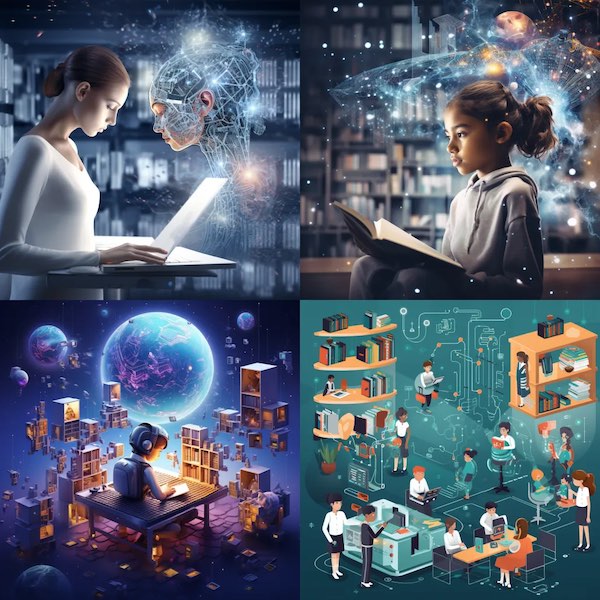 (Written by Scarsdale Village Trustee Sameer Ahuja)
(Written by Scarsdale Village Trustee Sameer Ahuja)
Party Guest: What are you going to do now?
Benjamin Braddock: I was going to go upstairs for a minute.
Party Guest: I mean with your future…?
Film fans, especially of the Baby Boomer variety, will likely recognize this dialogue from Mike Nichols’ classic The Graduate (1967). During what should be a happy graduation party, our hero Benjamin Braddock (Dustin Hoffman) instead finds himself lost. Confused. Especially as he’s on the receiving end of so many questions surrounding what’s to become of him.
This scene perfectly illustrates the fraught transition from college to the “real world.” Braddock epitomizes the fear and uncertainty surrounding what to do with one’s hard-earned degree.
It seems that no matter who you are, if you’re a young person, you can’t escape this burning question: “So what are you doing with your life?”
Nearly 60 years have passed since the release of this cultural touchstone. Today’s grads may look quite different—suits and ties are out, sneakers are in at family gatherings—but their existential angst hasn’t gone away.
In fact, for today’s young adults, the above question is becoming increasingly harder to answer. Even before ChatGPT threatened to zap so many “safe” white collar jobs, many a grad struggled with how to apply their degree to stable career paths.
In a recent study by ZipRecruiter, some top majors most lamented by students include: journalism, sociology, and education. And while these studies originate from different academic fields, they all have one thing in common: Lack of job prospects.
It’s not the fact that these fields aren’t useful. If anything, with increasing disruption to our information delivery systems and educational institutions, we need more trained experts in these areas. It’s the current ROI on these degrees.
What is the ROI on College Education?
Endless columns have been inked about the discrepancies in quality and accessibility of pre-college education across the U.S. This topic continues to spark heated debate across the country, but less contentious is the enduring reputation of America's higher education system. Among the vibrant tableau of global higher education, U.S. colleges and universities command a bright corner, frequently crowning the upper tiers of global rankings.
These institutions, renowned for groundbreaking research, unparalleled faculty, cutting-edge facilities, and a kaleidoscopic array of courses that inspire intellectual curiosity, serve as more than just a springboard for academic excellence.
Yet, it's the nebulous relationship between the ever-escalating costs of this education and the prospective career outcomes in an accelerating 21st-century world that raises eyebrows and concern alike.
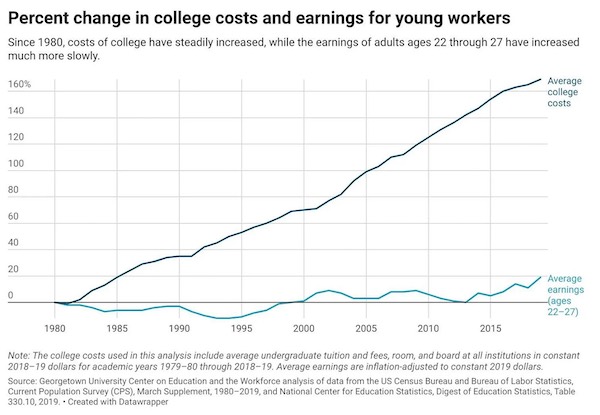
For starters, soaring costs are leading many to question the value of the four-year degree. Our traditional cause-and-effect relationship between a degree and higher earning power is crumbling before our very eyes. And for those who choose to attend, student loans are preventing them from fully participating in our economy.
It’s therefore no surprise that American youth are increasingly considering eschewing the college path, opting instead for more practical, job-specific education. Especially men. As this Breaking Points segment reveals, males are fleeing universities. By the millions.
Meanwhile, alternatives like trade schools are exploding in popularity. Real-life experiences and skill-specific training are also gaining prominence, offering yet another path to success. This comes at a time when we could use all the mechanics and engineers we can get—the subject of a recent CAO article.
But this is not just some blue-collar revolution.
Today’s knowledge workers are also questioning college’s value. Especially since marquee employers like IBM, Accenture, and Bank of America have all dropped requirements for four-year degrees, citing labor shortages and their ability to train entry-level personnel on the job.
Simultaneously, companies like Google are investing millions in targeted employee education and online certification programs. These offerings are also more affordable and require less commitment than four years at school—often the monetary equivalent of taking out a home mortgage.
All this points to one inescapable truth: In our quickly evolving economic landscape, a plurality of options exist to answer our initial query: “So what are you doing with your life?”
How Has Tech Impacted Education?
There has been an explosion of tech in education. Virtual classes and remote learning are here to stay, enabling a more personalized curriculum. Cutting edge VR also offers immersive learning experiences that were the stuff of The Jetsons’ back in the ‘60s.
Digital learning platforms have gained incredible traction. In a rapidly changing world, online platforms are not only serving the education needs of young students but also offering a multitude of opportunities for adults seeking continuous learning. For example, Khan Academy, has attracted over 130 million learners. Digital learning platforms like Coursera and Udemy provide a plethora of courses, from marketing to coding, that enable professionals to keep their skills up-to-date or pivot their careers entirely. These platforms offer a self-paced, customized learning experience, enabling students to grasp concepts at their own speed. The shift toward lifelong learning is being recognized as a necessity, given the pace of technological change and job market volatility.
Advancements in tech and skills-based learning models challenge the traditional notion of a college education. But they’re not without their faults. Already, we saw how remote learning failed to live up to many of its promises during the COVID-19 school closures.
The revolution is not limited to the U.S. It's unmistakable how technology has revolutionized education in China. Classrooms have been transformed with the advent of digital learning, with platforms like VIPKid and TAL Education stepping up to the plate. These platforms have been game-changers, providing top-tier educational resources even to students tucked away in the most remote corners of the country. But the real driving force behind this shift was the Chinese government's "Internet Plus" strategy, a catalyst that set the edtech scene ablaze with startups and investments. Fast-forward to today, AI-powered platforms like Squirrel AI are redefining what personalized learning means - adapting and evolving with every student. And as if this isn't exciting enough, China's 2020 New Infrastructure Initiative is pouring resources into 5G technology and AI. This sets the stage for next-gen learning experiences, where virtual and augmented reality step out of the realms of science fiction and into the classroom.
What About AI and Education in the US?
In the ever-evolving landscape of American education, AI emerges as a beacon of hope, potentially reshaping the terrain and fostering equitable opportunities. Here's why it's a cause for optimism, especially for those who've been kept at the periphery of quality education, courtesy of age-old systemic hurdles.
First off, let's acknowledge the elephant in the room - the daunting disparities in U.S. education tied to geography and economic status. Undoubtedly, low-income areas and their schools often get the short end of the stick - limited resources, teeming classrooms, and a dearth of well-trained educators. But here's where AI flexes its muscles. Imagine AI-powered e-learning platforms, dishing out tailor-made, top-notch educational content to every student, without any regard for their location or their school's fiscal health. Sounds like a revolution, doesn't it? Will we really have AI-powered instructors? Actually, Harvard is already rolling them out.
Consider AI tutors, not constrained by classroom capacity or teacher-student ratios, but focused solely on individual instruction. Every student gets personalized attention, with AI seamlessly adapting to each learner's unique style, strengths, and areas of improvement. Suddenly, the daunting challenge of large student-to-teacher ratios in underfunded schools looks less intimidating. Marc Andreessen, co-founder of A16Z says:
“Every child will have an AI tutor that is infinitely patient, infinitely compassionate, infinitely knowledgeable, infinitely helpful. The AI tutor will be by each child’s side every step of their development, helping them maximize their potential with the machine version of infinite love.”
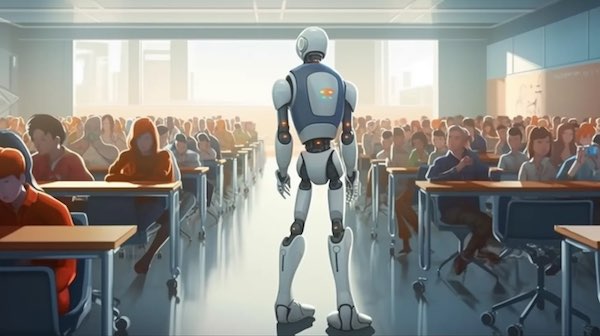 AI's potential isn't confined to personalization. It's also a gateway to an almost infinite expanse of resources. Think of a student diving into an ocean of knowledge, where AI-driven educational platforms offer everything from intricate math puzzles to intriguing historical narratives. It's like having an expansive, limitless library, always at their disposal.
AI's potential isn't confined to personalization. It's also a gateway to an almost infinite expanse of resources. Think of a student diving into an ocean of knowledge, where AI-driven educational platforms offer everything from intricate math puzzles to intriguing historical narratives. It's like having an expansive, limitless library, always at their disposal.
For students grappling with English as a second language, AI dons the hat of a patient and effective language coach. AI-powered apps can offer instant translations and language lessons, empowering students to fully engage in classroom discussions and absorb curriculum content seamlessly. What if you could read and comprehend three books per day with an AI-assisted reader, helping you fly through chapters in a fraction of the time?
Another ace up AI's sleeve is its ability to detect learning difficulties early. By constantly evaluating a student's performance and detecting anomalies, AI can signal potential problems before they snowball into unmanageable hurdles. This proactive approach can be a lifeline for students who risk being lost in crowded classrooms where personalized attention is a rare commodity.
Of course, the path to harnessing AI's full potential isn't without its obstacles, with the digital divide being a prominent one. To make AI a universal educational tool, we need to bridge this gap. That's where collaborations between tech giants, governmental entities, and education institutions can play a significant role, ensuring even the underprivileged have the necessary tech infrastructure and internet access. The goal? A digital device and reliable internet service for every child, irrespective of their economic background.
Yes, there's much ground to cover before AI can fully realize its potential in education, but the journey seems promising. With careful planning and execution, AI could emerge as a crucial ally in the pursuit of equal educational opportunity for all U.S. students.
No matter what happens next, AI heralds an exciting era where we may shed the one-size-fits-all educational model, allowing students a more self-determined path focused on personalized goals.
What Does This Mean for Traditional Education?
Just like our preference-based entertainment algorithms, AI-driven systems can adapt to individual learning styles, providing tailored instruction, enhancing educational outcomes. This begs a different question: While the full impact of AI in education is yet to be realized, might it democratize the whole endeavor, producing a nation of autodidacts—or self-taught individuals?
 Sameer AhujaA transition to a more decentralized model of education comes with its own challenges. Ensuring quality and consistency in a system where everyone is following their own educational path can be difficult. The role of the teacher is also evolving, from a primary source of knowledge to a facilitator guiding students on their personalized learning journeys.
Sameer AhujaA transition to a more decentralized model of education comes with its own challenges. Ensuring quality and consistency in a system where everyone is following their own educational path can be difficult. The role of the teacher is also evolving, from a primary source of knowledge to a facilitator guiding students on their personalized learning journeys.
Furthermore, the shift towards more job-specific education raises questions about social mobility. As students start specializing early, they could find themselves tied to specific industries or career paths, which might restrict their ability to shift gears in an unpredictable economy. The flexibility that comes with a broader, liberal arts education may be missing in this new paradigm.
As we navigate this era of profound change, one thing is for certain—more uncertainty. And while it’s normal for young adults to feel the many doubts evidenced by Benjamin Braddock, it's also vital we ensure learners are equipped with skills to thrive, not just survive, in our fascinating new world.
Fireworks Spectacular at the Scarsdale Pool
- Details
- Written by Joanne Wallenstein
- Hits: 2056
 Fireworks Spectacular (Thursday, June 29th)
Fireworks Spectacular (Thursday, June 29th)
The Village of Scarsdale’s Annual Fireworks Spectacular, open to the public, will be presented at the Scarsdale Pool on Thursday, June 29th, at 9:15 PM. Returning to the spectacular will be a performance by the Westchester Band beginning at 7:30PM. Please note that a $5.00 fee will be charged to all non-pool members entering the pool starting at 5PM in conjunction with the scheduled fireworks. Beginning at 8PM ALL individuals entering the Pool Complex will be charged $5.00. Picnicking is allowed on the grounds, but alcoholic beverages and smoking are not permitted. Pool members wishing to avoid paying the $5 fee are advised to enter the pool facility before 8PM.













